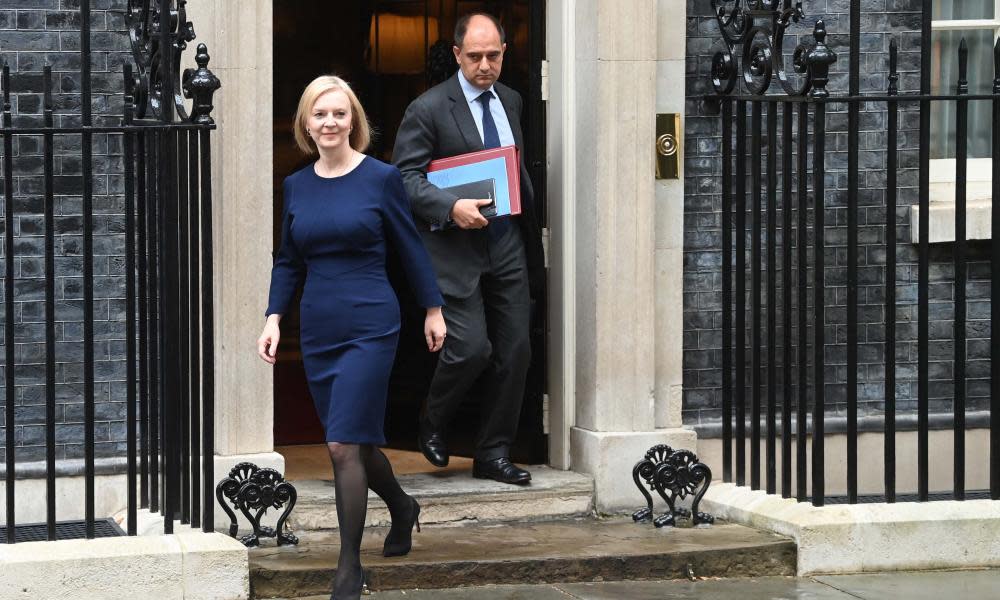Time is against Liz Truss as she bets big on plan to turn economy around

When Liz Truss flew to the US this week on her first foreign trip as prime minister, she was unequivocal about how she would achieve her mission in office: “Lower taxes lead to economic growth, there is no doubt in my mind about that.”
There was not a quiver of self-doubt in her voice as she gave a round of television interviews at the top of the Empire State Building expanding on her plans for the economy and saying she was “willing to be unpopular” to push them through.
The prime minister may not have anticipated just how quickly her own Tory MPs would start criticising her radical new approach, turning Treasury orthodoxy on its head. “I have never known the party so divided,” one sceptical MP said. “She’s clearly decided she goes big or goes home.”
Truss is acutely aware that time is not on her side. She has inherited the worst public finances in a generation, a country going through a cost of living crisis, and creaking public services. The next general election is two years away. It’s a mammoth task to even start to turn it around before then.
However, she also knows she will never be more powerful than her first few weeks in office. For now, most of her critics on the Tory backbenches are keeping their counsel – at least publicly – and government departments are primed for action.
She and her chancellor, Kwasi Kwarteng, have been working on plans for government for over a decade, ever since they wrote their book Britannia Unchained, the first draft of Trussonomics, a rip-roaring ride through free markets, deregulation and the small state. She is determined to make seismic changes.
One ally says: “It’s not going to be a comfortable two years. Liz isn’t afraid to break things. But if she can boost growth and people feel like they’ve got a bit more money in their pockets before the next election, it will be worth it.”
Not everybody on her own side agrees. The Commons benches behind Kwarteng were muted. Grim-faced MPs barely raised a cheer. Some of those with “red wall” seats are aghast that tax cuts so disproportionately benefit the rich. “It’s electoral suicide,” one despaired. Even some of her supporters admit her plans are “brilliant, or they are bonkers”.
If they go right, she wins big, turning round the economy and winning another term in office. If they go wrong – as many mainstream economists and politicians suspect they will – it could be an economic disaster that would shred the Tories’ economic credibility in a way not seen since Black Wednesday in 1992.
The success, or otherwise, of her experiment will take months to measure. There will be a swathe of new legislation, scrapping the rules on everything – from planning to finance to immigration – that she believes has held back growth. But its path through parliament will almost certainly be bumpy.
The eventual publication of the Office for Budget Responsibility’s forecasts will be another moment of acute danger for Truss. The Treasury has seen a draft, but is refusing to release details, prompting fears that the projections undermine her promise to boost growth by 2.5% “in the medium term” – generally assumed to be in the next two to five years.
There is now a stark ideological divide with Labour, which is kicking off its party conference in Liverpool this weekend, with senior opposition figures deliberating how to take on a government it has criticised for raising taxes but is now slashing them, while their own plans for growth are not yet cutting through. With £72bn of extra borrowing between now and April, some are questioning whether there will be any money left for their own spending plans.
Kwarteng heralded a “new approach for a new era” – despite the fact he and Truss have both been in government for years – as he announced the biggest tax cuts since the then chancellor Anthony Barber’s “dash for growth” in 1972.
Barber’s radical plan to boost growth was seen as a bold experiment for a while. The economy did indeed pick up speed. Truss and Kwarteng could also see a brief economic “sugar rush” once the markets get used to the idea. But Barber’s proposals ended in economic disaster. With inflation at more than 10%, interest rates set to rise further and a recession on the cards, it is difficult to see Trussonomics ending any differently.


